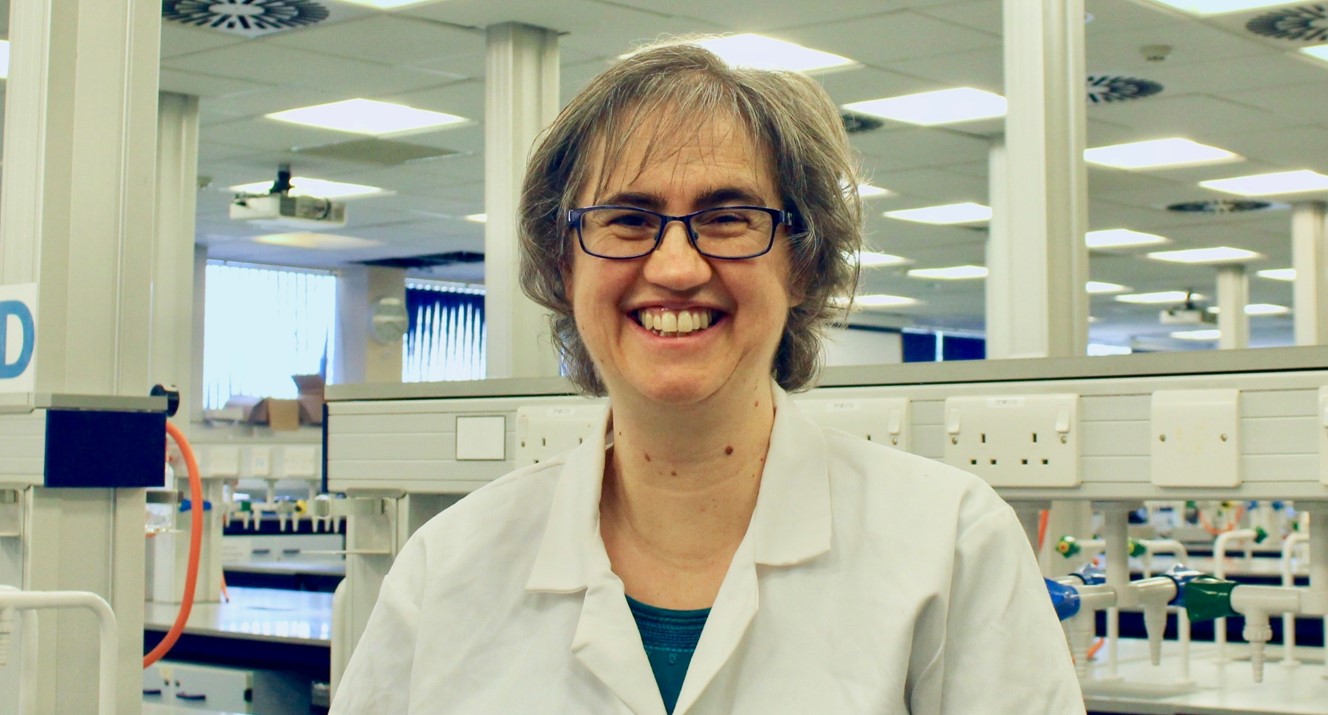Masters applications for 2023 entry are now closed.
Applications for September 2024 will open on Monday 25 September. Applications are now open for programmes with a January 2024 start. View our programmes »
| UCAS code |
1234 |
| Duration |
2 years full time |
| Entry year |
2025 |
| Campus |
Streatham Campus
|
| Discipline |
Biosciences
|
| Contact |
|
Overview
- Research-driven programme offering two research projects over 2 years
- The advanced laboratory skills module provides specialised training and advanced data processing
- You will undertake two substantial research projects working within two of our world-leading research groups
- Prepares graduates with the key skills for a career in research
Top 20 in the UK for world-leading research in Biological Sciences
Opportunity to specialise with a choice of pathways
Advance laboratory skills with specialist techniques training
Substantial research project within one of our world-leading research groups
The suite of programmes naturally builds on our internationally-leading undergraduate degrees, providing a rich and focused research-led experience. It works both ways - a fantastic opportunity for students to enhance their specialist training, while welcoming a new cohort of enthusiastic, budding scientists into our Departmental community.
Professor James Wakefield
Head of Biosciences
Course content
The MRes Advanced Biological Sciences programme is a research-driven programme that will be taken over two academic years enabling you to complete two research projects.
In year one, you will receive training in laboratory methods and transferable skills, take three taught modules and complete your first 45 credit research project. In year two, you will be supported in submitting UK-wide PhD studentship applications, learn how to write effective research proposals, take a core Advanced Topics module plus one other module from an extensive suite of options, and undertake your second, more extensive research project (75 credits).
The core modules will provide you with the knowledge and skills required to develop your research projects which will be supervised from within two of our world-leading research groups, determined by your research project focus.
The modules we outline here provide examples of what you can expect to learn on this degree course based on recent academic teaching. The precise modules available to you in future years may vary depending on staff availability and research interests, new topics of study, timetabling and student demand.
75 credits of compulsory modules and 45 credits of optional modules
a You cannot choose the same optional module in Stage 1 and Stage 2
Compulsory modules
| Code | Module |
Credits |
|---|
| BIOM509 |
Professional Skills | 15 |
| BIOM549 |
Advanced Laboratory Skills | 15 |
| BIOM550 |
Research Project 1 | 45 |
Optional modules
| Code | Module |
Credits |
|---|
|
MRes Advanced Biological Sciences Stage 1 optional modules 24-25 [See note a] |
| BIOM543 |
Ecology of Environmental Change |
15 |
| BIOM544 |
Ecotoxicology |
15 |
| BIOM545 |
Frontiers in Plant Biology |
15 |
| BIOM546 |
Living in a Microbial World |
15 |
| BIOM547 |
Frontiers in Molecular Cell Biology |
15 |
| BIOM548 |
Cell Biology of Disease |
15 |
| BIOM551 |
Biology of Marine Vertebrates |
15 |
| BIOM553 |
Current Issues in Marine Biology |
15 |
| BIOM554 |
Advanced Applications of Physiology |
15 |
| BIOM515 |
Cellular Basis of Immunity |
15 |
| BIOM516 |
Bioinformatics |
15 |
| BIOM567 |
Application of Genomics in Infectious Disease |
15 |
| BIOM568 |
Blue Planet |
15 |
| BIOM570 |
Beyond the Frontiers of Medical Mycology |
15 |
| BIOM571 |
Molecular Biology of Bacterial Infection |
15 |
| GEOM149 |
Green Planet |
15 |
| CSC3011 |
Medical Genomics |
15 |
| CSC3009 |
Pharmacogenomics |
15 |
| HPDM041 |
Bioinformatics, Interpretation and Data Quality Assurance in Genome Analysis |
15 |
| NSCM005 |
Mathematical Modelling in Biology and Medicine |
15 |
| BIOM555 |
Bioimaging |
15 |
| PSYM205 |
Advances and Methods in Animal Behaviour |
30 |
| PSYM213 |
Current Research Issues in Animal Behaviour |
15 |
105 credits of compulsory modules and 15 credits of optional modules
a You cannot choose the same optional module in Stage 1 and Stage 2
Compulsory modules
| Code | Module |
Credits |
|---|
| BIOM569 |
Research Project | 90 |
| BIOM527 |
Research Grant Proposal | 15 |
Optional modules
| Code | Module |
Credits |
|---|
|
MRes Advanced Biological Sciences Stage 2 optional modules 24-25 [See note a] |
| BIOM515 |
Cellular Basis of Immunity |
15 |
| BIOM543 |
Ecology of Environmental Change |
15 |
| BIOM544 |
Ecotoxicology |
15 |
| BIOM545 |
Frontiers in Plant Biology |
15 |
| BIOM546 |
Living in a Microbial World |
15 |
| BIOM547 |
Frontiers in Molecular Cell Biology |
15 |
| BIOM548 |
Cell Biology of Disease |
15 |
| BIOM551 |
Biology of Marine Vertebrates |
15 |
| BIOM553 |
Current Issues in Marine Biology |
15 |
| BIOM554 |
Advanced Applications of Physiology |
15 |
| BIOM516 |
Bioinformatics |
15 |
| BIOM567 |
Application of Genomics in Infectious Disease |
15 |
| BIOM568 |
Blue Planet |
15 |
| BIOM570 |
Beyond the Frontiers of Medical Mycology |
15 |
| BIOM571 |
Molecular Biology of Bacterial Infection |
15 |
| GEOM149 |
Green Planet |
15 |
| CSC3011 |
Medical Genomics |
15 |
| CSC3009 |
Pharmacogenomics |
15 |
| HPDM041 |
Bioinformatics, Interpretation and Data Quality Assurance in Genome Analysis |
15 |
| NSCM005 |
Mathematical Modelling in Biology and Medicine |
15 |
| BIOM555 |
Bioimaging |
15 |
| PSYM213 |
Current Research Issues in Animal Behaviour |
15 |
During your MRes you can, if you wish, choose to specialise in one of seven specialist pathways:
- Animal Biology
- Bioinformatics
- Ecotoxicology
- Frontiers in Plant Science
- Microbiology and Infectious Disease
- Molecular and Cellular Biology
- Sustainable Aquaculture
You will receive advice about the specialisms once you’re at Exeter so you don't need to make any decisions in advance.
Specialist modules
To be awarded a bracketed specialism on the MRes, at least 45 credits should be selected from the specialist modules grouped below. Your research projects (modules BIOM550 and BIOM518) must both also be relevant to the specialist field.
You may take optional modules as long as any necessary prerequisites have been satisfied, where the timetable allows, and if you have not already taken the module in question or an equivalent module.
*You cannot choose this module if you have already taken the undergraduate version.
MRes Advanced Biological Sciences (Animal Biology)
| Code |
Module title |
Credits |
Compulsory |
| BIOM551 |
Biology of Marine Vertebrates (variant of BIO3098)* |
15 |
No |
| BIOM553 |
Current Issues in Marine Biology (variant of BIO3083)* |
15 |
No |
| BIOM554 |
Advanced Applications of Physiology |
15 |
No |
| BIOM4043 |
Rewilding the UK |
30 |
No |
| PSYM205 |
Advances and Methods in Animal Behaviour |
30 |
No |
| PSYM213 |
Current Research Issues in Animal Behaviour |
15 |
No |
MRes Advanced Biological Sciences (Bioinformatics)
| Code |
Module title |
Credits |
Compulsory |
| BIOM516 |
Bioinformatics (variant of BIO3092)* |
15 |
Yes |
| BIOM567 |
Applications of Genomics in Infectious Disease |
15 |
Yes |
| CSC4007 |
Medical Genomics |
15 |
No |
| CSC4005 |
Pharmacogenomics |
15 |
No |
| HPDM041 |
Bioinformatics, Interpretation and Data Quality Assurance in Genome Analysis |
15 |
No |
| NSCM005 |
Mathematical Modelling in Biology and Medicine |
15 |
No |
MRes Advanced Biological Sciences (Ecotoxicology)
| Code |
Module title |
Credits |
Compulsory |
| BIOM568 |
Blue Planet |
15 |
Yes |
| BIOM544 |
Ecotoxicology (variant of BIO3067)* |
15 |
Yes |
| BIOM543 |
Ecology of Environmental Change (variant of BIO3037)* |
15 |
No |
| BIOM4043 |
Rewilding the UK |
30 |
No |
| BIOM554 |
Advanced Applications of Physiology |
15 |
No |
MRes Advanced Biological Sciences (Frontiers in Plant Science)
| Code |
Module title |
Credits |
Compulsory |
| BIOM545 |
Frontiers in Plant Biology (variant of BIO3046)* |
15 |
Yes |
| BIOM546 |
Living in a Microbial World (variant of BIO3097)* |
15 |
Yes |
| GEOM149 |
Green Planet |
15 |
Yes |
MRes Advanced Biological Sciences (Microbiology and Infectious Disease)
| Code |
Module title |
Credits |
Compulsory |
| BIOM525 |
Molecular Basis of Infection (variant of BIO3079)* |
15 |
No |
| BIOM515 |
Cellular Basis of Immunity (variant of BIO3078)* |
15 |
No |
| BIOM534 |
Medical Mycology |
15 |
No |
| BIOM567 |
Applications of Genomics in Infectious Disease |
15 |
No |
MRes Advanced Biological Sciences (Molecular and Cellular Biology)
| Code |
Module title |
Credits |
Compulsory |
| BIOM525 |
Molecular Basis of Infection (variant of BIO3079)* |
15 |
No |
| BIOM515 |
Cellular Basis of Immunity (variant of BIO3078)* |
15 |
No |
| BIOM547 |
Frontiers in Molecular Cell Biology (variant of BIO3077)* |
15 |
No |
| BIOM548 |
Cell Biology of Disease (variant of BIO3086)* |
15 |
No |
| NSCM009 |
Bioimaging |
15 |
No |
MRes Advanced Biological Sciences (Sustainable Aquaculture)
| Code |
Module title |
Credits |
Compulsory |
| BIOM568 |
Blue Planet |
15 |
Yes |
| BIOM551 |
Biology of Marine Vertebrates (variant of BIO3098)* |
15 |
No |
| BIOM553 |
Current Issues in Marine Biology (variant of BIO3083)* |
15 |
No |
| BIOM554 |
Advanced Applications of Physiology |
15 |
No |
*You cannot choose this module if you have already taken the undergraduate version.
Entry requirements
Minimum 2:2 Honours degree with 55% and above or equivalent in a relevant science subject.
Relevant subjects include: Biological Sciences, Cell Biology, Ecology, Ecology and Conservation, Evolutionary Biology, Genetics, Marine Biology, Molecular Biology, Microbiology, Plant Science, Zoology.
Entry requirements for international students
English language requirements
International students need to show they have the required level of English language to study this course. The required test scores for this course fall under Profile B2. Please visit our English language requirements page to view the required test scores and equivalencies from your country.
The MRes programme at Exeter is research focussed and you will complete two research projects in our world-leading research laboratories which is an excellent preparation for a research career. If you wish, you can specialise in an area of Biology you are most interested in, or you can do your research projects in two different areas thereby broadening your research portfolio.
Dr Alison Hill
Programme Director and Senior Lecturer
Fees
2025/26 entry
UK fees per year:
£11,500 full-time
International fees per year:
£16,600 full-time
Scholarships
We invest heavily in scholarships for talented prospective Masters students. This includes over £5 million in scholarships for international students, such as our Global Excellence Scholarships*.
For more information on scholarships, please visit our scholarships and bursaries page.
*Selected programmes only. Please see the Terms and Conditions for each scheme for further details.
Teaching and research
How will I learn?
- Lectures
- Seminars
- Workshops
- Group discussion
- Independent study
The programme consists of core modules that provide you with a theoretical and applied learning framework for directed student-centred learning in which you will develop skills of synthesis, critical analysis, and interpretation. In addition, you will receive professional skills training tailored to the areas most relevant to your academic and professional development.
Research project
You will carry out your independent supervised research projects in one of our world-leading research laboratories. Research projects are individual and can be based on laboratory work, field work or in silico (e.g. bioinformatics).
The research projects will give you first-hand experience in many aspects of research work including data generation, analysis, and interpretation as well as science communication in written, poster and oral presentations.
Facilities
Depending on your chosen modules and research project topics, you may have access to the following facilities:
Tutorial support
You will be allocated a personal tutor who is available for advice and support throughout your studies. There is also a postgraduate tutor available to help with further guidance and advice. In addition, the programme director will offer every student a meeting each term to review academic progress.
Assessment
Taught modules are assessed through essay examinations, individual and group-based coursework assignments, oral presentations, in-module tests and reports or essays. A significant proportion of the marks are based on your substantial research projects and the associated papers.
Read more

Professor Eduarda Santos
Associate Professor in Environmental Biology

Dr Alan Brown
Senior Lecturer in Molecular Microbiology

Professor Vinod Kumar
Associate Professor of Plant Biology

Dr Alison Hill
Programme Director and Senior Lecturer

Professor James Wakefield
Professor of Integrative Cellular Biology and Head of Biosciences
Professor Eduarda Santos
Associate Professor in Environmental Biology
Professor Santos is an environmental biologist investigating reproductive development and function and the susceptibility of these processes to disruption by environmental stressors. Her research focuses on fish and has ranged from investigating the endocrine control of reproduction to addressing the population level effects of chemical exposure for wild fish, using systems biology strategies.
Profile page
Follow Eduarda on Twitter
Dr Alan Brown
Senior Lecturer in Molecular Microbiology
Dr Brown is a molecular microbiologist interested in defining mechanisms of virulence and niche adaptation in pathogenic bacteria, and how these impact on host-microbe interactions during infection. He has a particular interest in bacterial pathogens associated with chronic lung infections, such as those associated with cystic fibrosis patients. By understanding both the epidemiology and virulence of such organisms, we hope to identify ways to optimise the treatment and management of these life-threatening infections.
Profile page
Professor Vinod Kumar
Associate Professor of Plant Biology
Professor Kumar is a biologist interested in the fundamental principles that underpin perception and integration of environmental signals in plants. He is particularly interested in understanding how plants sense temperature and other seasonal cues to coordinate growth, development and immune responses. His current research is seeking to understand the genetic and epigenetic mechanisms of gene regulation in response to the environment, and adaptation of these mechanisms to local and dynamic environments.
Profile page
Vinod's LinkedIn profile
Dr Alison Hill
Programme Director and Senior Lecturer
Dr Hill specialises in secondary metabolism and teaches chemistry and biochemistry. She carries out pedagogical research into incorporating mathematics into the curriculum. Alison is an Exeter Incubator Fellow and Senior Fellow of the HEA. She is the Senior Tutor for the Masters students and is module lead for the Professional Skills module.
Profile page
Alison's LinkedIn profile
Professor James Wakefield
Professor of Integrative Cellular Biology and Head of Biosciences
Professor Wakefield’s research interest has always been that of mitosis and cell division, stimulated by the fundamental beauty of the process as viewed using a fluorescence microscope, and its key role in diseases such as cancer. He wants to understand how these systems organise themselves, and what governs the similarities and differences between them in diverse types of cell, at different stages of development, and during disease. He takes a multi-disciplinary approach, combining proteomics, bioinformatics and quantitative image analysis with qualitative, descriptive cell and developmental biology, and genetics.
Profile page
Follow James on Twitter
Wakefield Lab website
Careers
Employer-valued skills this course develops
This programme will provide you with a diversity of skills that will equip you for a range of sectors of work but it will particularly prepare you for PhD study or a career in research.
Skills include:
- Analytical skills
- Applied statistics
- Scientific writing
- Independent learning
- Critical evaluation
- Research techniques
- Oral communication
Careers services
Our careers teams at the Career Zone can help guide you through a wealth of information to match your skills and interests to a career that will suit you. Our staff work with regional, national and international employers to develop new work placement, project and graduate opportunities.
















